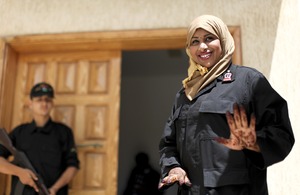New UK boost to economy and policing in Libya
New funding from the UK will help train 4000 new police recruits a year and boost the private sector

The new academy will support the training of new recruits like police officer Hafsa Hussein. Picture: Iason Foounten/UN Photo
The UK will provide vital support to the economy and policing in Libya, International Development Minister Alan Duncan announced from Tripoli today, ensuring gains made since the overthrow of Qadhafi will not be lost.
The UK will help renovate Libya’s police training academy so that it can provide residential courses to train more than 4000 new recruits a year.
In addition, £2.5 million in new UK funding will help invigorate the private sector. The new support will also be used to overhaul the way job centres work, train local specialists to support small businesses and encourage businesses to diversify into non-oil based work.
Taken together, the new package of support is intended to secure recent economic and security progress in the country, helping to build a prosperous and peaceful post-Qadhafi state for the Libyan people.
Speaking from Tripoli, Alan Duncan said:
The Arab Spring promised a freer, more prosperous future for millions across Libya, but the process of building a post-Qadhafi state was never going to happen overnight. Youth unemployment was one of the main driving factors behind the 2011 uprising and today it’s estimated nearly one in three Libyans are without a job. Boosting the economy is key to addressing underlying causes of instability and building a more prosperous future, with the ultimate aim of ensuring that the wealth generated by the nation benefits the people of the nation.
As we have seen, where the police aren’t able to enforce the rule of law and provide security then armed militia groups emerge – untrained, unaccountable and creating a very real risk to the public they purport to protect. A police force capable of delivering results and holding the people’s trust is at the heart of realising a Libya that is more stable, more democratic and more accountable to its citizens.
Mr Duncan was in Libya for a 2 day visit that included meetings with President Megarief and Prime Minister Dr Ali Zeidan, as well as a number of government ministers. He visited the police training academy that the UK will help to renovate - the same academy that Prime Minister David Cameron visited in January this year - and also met Libyan entrepreneurs to hear their business plans and discuss some of the challenges and opportunities they face.
Renovating the police academy is the most recent commitment in UK support for security and justice in Libya since the uprising against Qadhafi began. The money will go towards facilities and training, helping over 500 new recruits to complete training every six weeks, improving public security as well as the Libyan people’s confidence in a professional, effective police force.
The UK more than tripled its bilateral support to reformers in the Middle East and North Africa last year. DFID supports economic reform and job creation in Egypt, Libya, Tunisia, Morocco and Jordan through the UK Arab Partnership, set up in 2011.